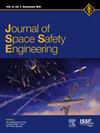Concept of operations for increasingly autonomous space operations
IF 1.7
Q3 ENGINEERING, AEROSPACE
引用次数: 0
Abstract
Concept of Operations (ConOps) documents provide a common view of future system functions to all stakeholders. This ConOps focuses on deep space missions, such as a mission to Mars. While Earth experts will be continuously monitoring operations during crewed deep-space missions, there will be communication delays and disruptions that will impede the rapid assistance required by the crew in time- and safety-critical situations. An argument will be made that the crew will require (some kind of) assistance to quickly understand the situation enough to safe the system. This document describes a notional vision of the operational processes, practices and capabilities needed by a deep space mission crew for them to autonomously respond to anticipated and unanticipated, time-critical anomalies. A descriptive model of a Crew Performance Support System (CPSS) is used to illustrate what will be required for a safe and successful manned mission to Mars. Scenarios will address crew, Earth-Support and technology roles/responsibilities, task prioritization, teaming strategies, complex procedure development and execution, assumptions, asynchronous collaboration under communication time delay and limited data exchange to illustrate potential operational needs and approaches. Scenarios are responsive to known human risks identified during and after long duration spaceflight and incorporate transition plans as space travel moves from ISS to Lunar to Mars operations specifically identifying test bed and research activity needs. The envisioned CPSS will alter the current operational paradigm of crew reliance on Earth experts to resolve anomalies. The intent of this ConOps is to advance the research and development of a CPSS.
日益自主的空间作战的作战概念
操作概念(ConOps)文档为所有涉众提供了未来系统功能的公共视图。这次ConOps的重点是深空任务,比如火星任务。虽然地球专家将在载人深空任务期间持续监测操作,但通信延迟和中断将阻碍宇航员在及时和安全关键情况下所需的快速援助。有人会说,宇航员需要(某种)帮助才能迅速了解情况,以确保系统的安全。该文件描述了深空任务人员自主响应预期和非预期、时间关键异常所需的操作流程、实践和能力的概念愿景。一个描述模型的船员性能支持系统(CPSS)是用来说明什么将需要一个安全和成功的载人火星任务。场景将涉及人员、地球支持和技术角色/责任、任务优先级、团队策略、复杂程序开发和执行、假设、通信时间延迟下的异步协作和有限的数据交换,以说明潜在的操作需求和方法。情景对长时间航天飞行期间和之后确定的已知人类风险作出反应,并在太空旅行从国际空间站转向月球和火星操作时纳入过渡计划,具体确定试验平台和研究活动需求。设想中的CPSS将改变目前宇航员依赖地球专家来解决异常情况的操作模式。本ConOps的目的是推进CPSS的研究和开发。
本文章由计算机程序翻译,如有差异,请以英文原文为准。
求助全文
约1分钟内获得全文
求助全文
来源期刊

Journal of Space Safety Engineering
Engineering-Safety, Risk, Reliability and Quality
CiteScore
2.50
自引率
0.00%
发文量
80
 求助内容:
求助内容: 应助结果提醒方式:
应助结果提醒方式:


